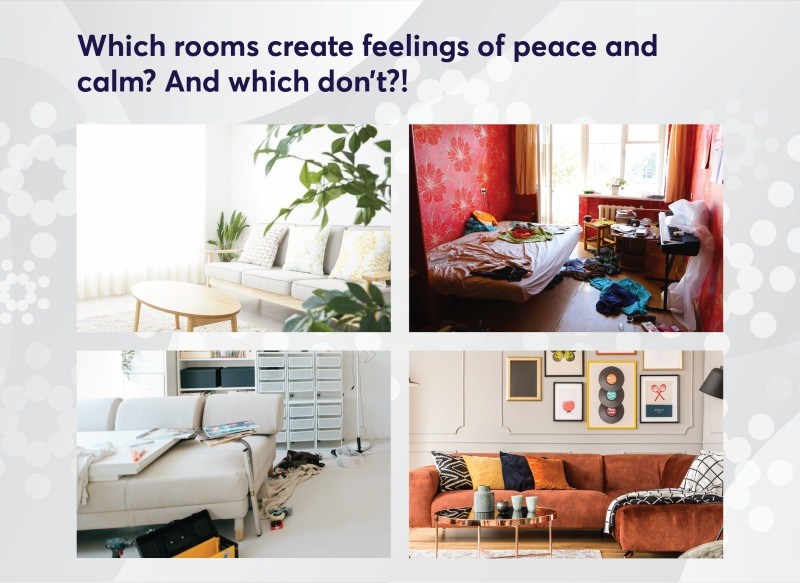- Home
- Mind & body
- Feng shui principles for home, mind and body: fact or fiction?
At CBHS we help you manage your health challenges. We believe in offering you the services, support and tools you need to live your best life.
Health and Wellness Programs are available to support eligible members towards a healthier lifestyle. Each Health and Wellness Program is subject to its own eligibility criteria.
Contact us for more information and to confirm your eligibility for a program.
Feng shui principles for home, mind and body: fact or fiction?

The ancient art of Feng shui is said to change the flow of energy in your home and have a positive effect on your peace and wellbeing – fact or fiction? The truth is there’s no scientific evidence to support these claims.
However, many people swear by the principles of Feng shui and the impact it can have on the harmony in their homes. So, there are principles from this ancient Chinese practice that you can apply to your life, home, mind and body – with equally positive results!
A brief history
Over 3,000 years ago a Chinese Emperor wanted to build a great city. The success of this empire was important to his legacy so he engaged geographical and environmental specialists to make sure his new city would prosper.
The new city had to be positioned:
- in a particular setting to endure nature’s harsh elements
- near a river for water and trade
- in the foothills to be protected from wind and the ravages of time
- high enough to guard against floods.
The Emperor also wanted his new city to be beautiful so people would want to live there. This type of practical planning for prosperous and harmonious living conditions is popularly known as Feng shui – which simply translates to, wind and water. And, in Chinese culture, wind and water are both linked to good health which is why Feng shui is considered to bring ‘good fortune’.
“Feng shui is ultimately a set of theories that uses nature, wisdom and beauty to create more comfortable, harmonious spaces.”
What is Feng shui?
This unique Eastern philosophy is based on the special arrangement of objects, living spaces and even buildings with the intention to attract balance, peace and prosperity. But despite Feng shui’s metaphysical history, much of its philosophy is basic common sense. Its purpose is to create harmonious relationships, and home and work environments. So, by applying these ancient principles we can hope to gain greater insight into how our external environment can be a mirror for our internal state.
We can learn to identify the symbols that surround us in order to become more intentional about how we arrange our lives, unconscious daily habits – and even what we eat and how we move and breathe.
In fact, when we reflect and make practical changes, our intentions and actions can enhance our work, relationships and even our homes.
3 quick ways you can Feng shui your living areas today
You don’t need to call in a pricey expert to create a few positive changes in your home. It can be as simple as:
- Using mirrors to give the illusion of more space
If you can’t create a great amount of space in your home because it’s too small, try placing mirrors in key spots to expand your living areas. You can also add tranquility through candles or by putting up artwork that reflects what you love. - Adding a few indoor plants to your décor
Plants cleanse the air from carbon dioxide so they can naturally help to add fresh air to your home environment. They also look great! - Letting the light in – or not
Keep your blinds open whenever possible to bring in the light and brighten the energy of a room. And place dark curtains in bedrooms to encourage calmer feelings more conducive to relaxation and sleep.

Bringing a little Feng shui harmony to your life today is easier than you think
Far from being a magical system, Feng shui is essentially about harmony. Its philosophy is based on the concept that all life is interconnected. And we naturally feel better when we are in beautiful, inviting and balanced environments. The same principles can be applied to the way we feel about ourselves – and our health.
We’ve put together a few easy tips you can start applying to your life – and home – today.
It’s time to de-clutter!
We’re all a little guilty of having too much stuff. Whether it’s those souvenirs you’re still holding onto from a trip to Fiji 30 years ago, or your baby boy’s first onesie and bib (he’s now in high school!), less is more when it comes to creating a place of peace and space in your home.
If your ‘things’ aren’t playing a specific role in your life, it’s time to throw them away or give them away. More than just being an eyesore that gets in your way, clutter can weigh us down emotionally and even be a health hazard if you’re constantly tripping over that stack of fashion magazines in the hallway that you’ve kept since your teens.
Feng shui is less about having a perfectly styled home, and more about creating a happy and healthy environment. It also invites us to look at our homes in a symbolic way so that we can get a greater insight into what’s going on for us simply
by looking at our living spaces.

This isn’t about feeling shame or judgement over our mess! It’s about learning to really see how we arrange each area, what we’re overlooking and what we may want to change. Perhaps you have a well organised home office or workspace, but your living room may be cluttered, which naturally inhibits your social life and relaxation.
No one wants to have company when their house is untidy. And a ‘messy living room’ could mean that you’re quite happy with work but might be avoiding social interaction. It’s easier to have an untidy lounge than to admit we need to take a few risks to expand our circle of friends.
Doing a simple good, old, fashioned spring clean of your cluttered spaces – including your home office, kitchen cupboards and living room – can help to clear your mind… and possibly create the opportunity for more memorable social occasions with new people!
“By being more intentional with your living space and how you eat, exercise and even breathe, you can add more harmony to your life.”
A breath of fresh air for a healthier body and mind
Qi is one of the most important elements in Feng shui philosophy. According to the Collins English dictionary, this small word literally means, energy.

The fact is, a lot of us take the simple act of inhaling and exhaling for granted. Yes, it’s second nature but we do it without thinking or realising the importance of our breath. The reality is, as our world gets faster and faster, it’s very easy to get so caught up with the pace of modern life, we often forget to take a deep breath!
A great way to calm your mind and body – particularly if you’re feeling stressed after a long day – is by doing ‘diaphragmatic breathing’. Focusing on your breath can help calm the nervous system by switching off our body’s ‘flight or fight’ mode.
Diaphragmatic triangle breathing in five easy steps:
- Sit up straight with your shoulders back.
- Breathe in, drawing air into your belly for four seconds.
- Hold for seven seconds.
- Breathe out for eight seconds with pursed lips making a ‘whoosh’ sound.
- Contract your belly (or diaphragm) to push the last of the air out.
Repeat this sequence three times and pay close attention to your exhale which is what really triggers your body’s relaxation response.
Eat right, sleep well and move your body
Yin and Yang is a Feng shui concept that conveys balance. And you already know that you can feel your best when your body and mind are in balance by:
- Enjoying a healthy, balanced diet
- Doing exercises that keep your body mobile and flexible
- Sleeping consistently well
- Keeping a calm mindset with practices like meditation or Tai chi.

It’s not science, but the principles of Feng shui can have a positive impact
An ancient eastern philosophy that’s over 3,000 years old, Feng shui is based on a few key concepts that we all know as common sense… from letting go of the clutter and stuff that’s weighing down your living space to taking deeper breaths and moving more for a balanced mind and body.
Far from being a magic formula for a happy and harmonious life, the guiding principles of Feng shui can help you develop a greater insight into the way you live – and even arrange your décor. Invest in a few beautiful plants, fill your fridge with nutritious, healthy food, get to bed on time for an energetic start to your day. Some people call it Feng shui – you can call it making a conscious decision to live a healthier, happier life.
All information contained in this article is intended for general information purposes only. The information provided should not be relied upon as medical advice and does not supersede or replace a consultation with a suitably qualified healthcare professional.
Sources:
https://www.cbhs.com.au/mind-and-body/blog/the-top-10-nutrition-tips-backed-by-science
https://www.cbhs.com.au/mind-and-body/fitness
https://www.cbhs.com.au/mind-and-body/blog/tips-for-getting-a-good-night-s-sleep
Feng Shui for Modern Living : Health Wealth and Happiness
https://www.cbhs.com.au/mind-and-body/blog/the-brain-gut-connection-is-stress-impacting-your-gut
https://www.cbhs.com.au/mind-and-body/blog/embracing-the-natural-flow-of-life-with-meditation
https://www.cbhs.com.au/mind-and-body/blog/the-a-zzzzzs-of-sleep-your-guide-to-sleeping-soundly
Health and wellbeing
programs & support
You Belong to More with CBHS Hospital cover:
- Greater choice over your health options including who treats you
- Get care at home with Hospital Substitute Treatment program
- Free health and wellbeing programs to support your health challenges
Live your healthiest, happiest life with CBHS Extras cover:
- Benefits for proactive health checks e.g. bone density tests, eye screenings
- Keep up your care with telehealth and digital options
- Save on dental and optical with CBHS Choice Network providers
